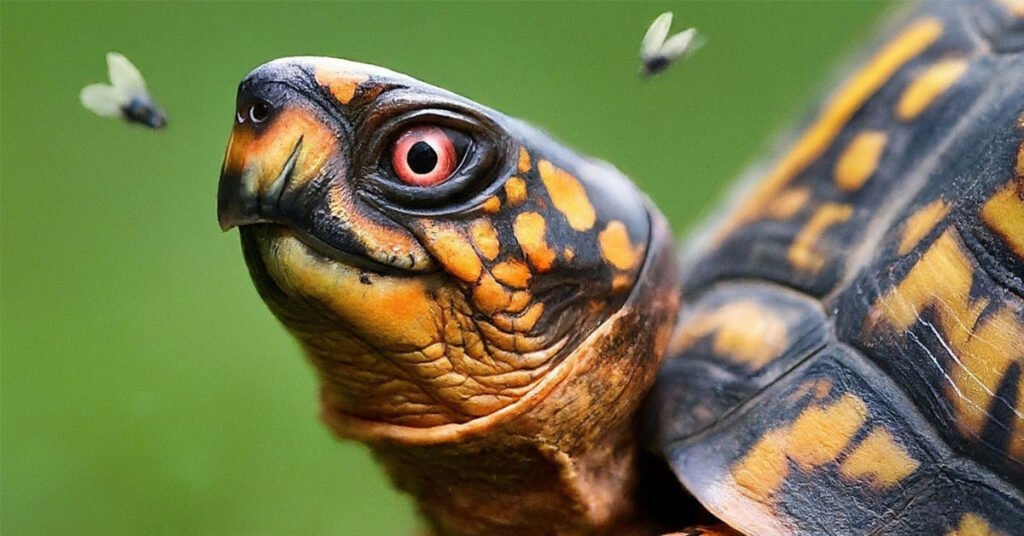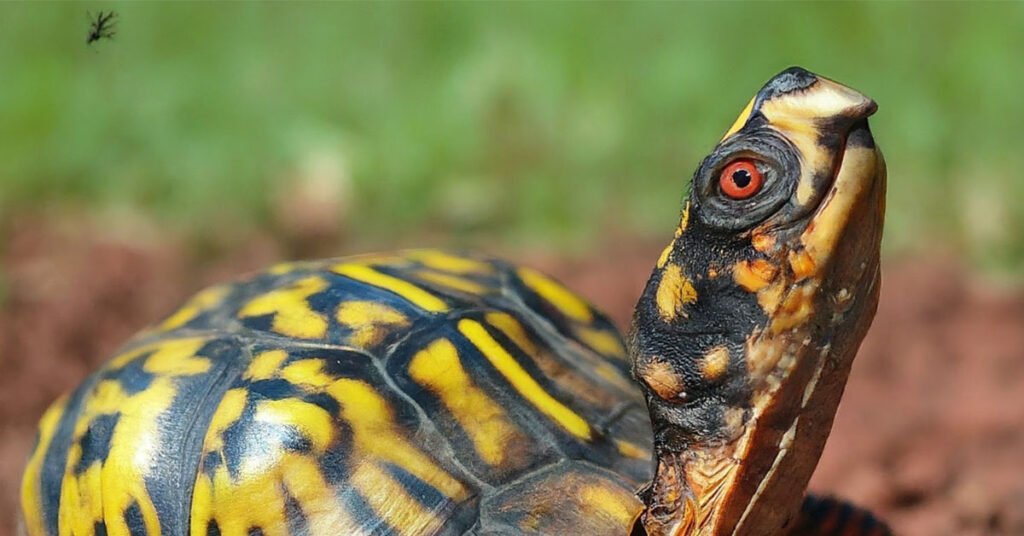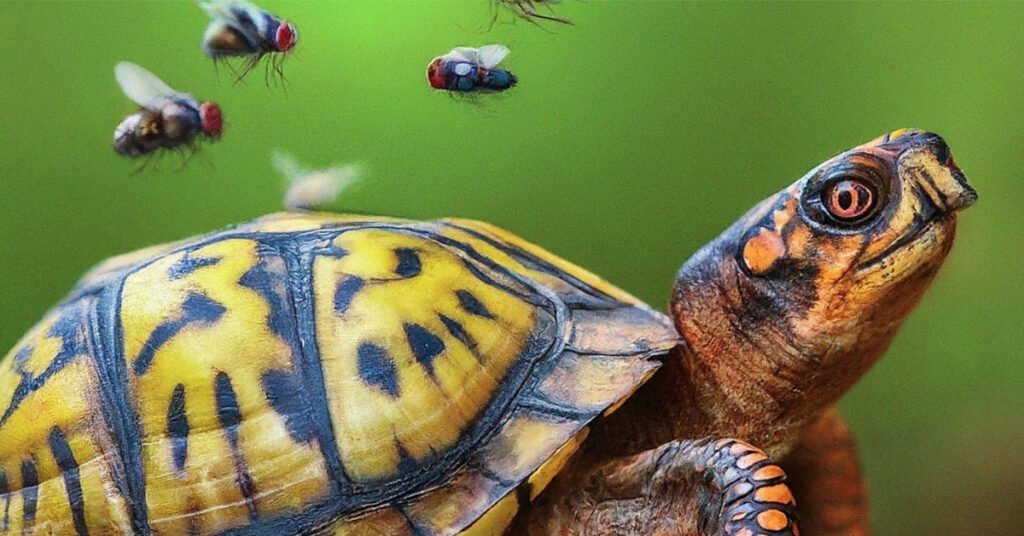Have you ever watched your turtle look at a pesky flying around their tank? If you noticed something like this, then you may have wondered, “Can turtles eat flies?” Turtles are omnivorous creatures, meaning they eat both plants and animals. Flies fall under the animal category, so it’s natural to be curious if turtles can consume them. Some turtles have an appetite for flies. Flies are insects and can be part of their natural diet.
But before you start including flies in your pet turtle’s diet, there are a few things to consider to keep your shelled friend safe and healthy. In this article, we’ll dig down into the question: can turtles eat flies, and are flies safe for turtles, or is it risky? Let’s find out if flies make a suitable snack for our shelled friends!
Can Turtles Eat Flies?

Yes, turtles can eat flies! It’s a natural part of their diet, and flies offer essential protein and engage their hunting instincts. Some turtle species eat flies, but not all turtles prefer to eat them. Some flies aren’t good for turtles, so it’s essential to get them from a safe source.
Additionally, while flies can be a healthy addition to a turtle’s diet, they should be part of a balanced meal plan. So, if your turtle enjoys munching on flies, offer them as a tasty treat.
What are the Nutritional Benefits of Flies to Turtles?
Generally, flies contain food that is less nutritious than many other healthy turtle diets. But flies might seem like pesky insects; for turtles, they’re delicious and provide some nutrition, mainly protein. Let’s find out some of the nutrition fly offers:
- Muscle Builders: Flies are packed with protein, which helps turtles grow strong and repair their tissues. It’s like a protein shake for them, keeping their bodies healthy and active.
- Energy Boosters: Flies also provide essential fats, giving turtles the energy they need for swimming, basking, and exploring their habitat. Imagine them as tiny energy bars for the turtles who love to eat flies.
Flies contain a tiny amount of vitamins. Here are some of the vitamins that flies offer in a small amount.
- B Vitamins: Flies offer a dash of B vitamins like B1, B2, and B3, which are vital for energy and health.
- Vitamin D: Flies provide some bone-loving vitamin D, essential for immunity and calcium balance.
- Vitamin K: Flies contain a bit of vitamin K, which is crucial for blood clotting and bone strength.
- Vitamin C: Flies hold a hint of vitamin C, which is excellent for immunity and collagen production.
- Vitamin E: Flies carry a small amount of vitamin E, guarding their cells against damage.
Remember: Flies may not have as many vitamins and minerals as some other bugs. But they’re packed with protein, which helps turtles build strong bones and shells. While flies are a great occasional treat, they shouldn’t be the only food source.
Giving turtles occasional insect treats, like flies, can boost their appetite and keep them healthy. A balanced diet with store-bought pellets, vegetables, and other insects is key to a happy and healthy turtle.
Potential Risks Of Flies For Turtles

While flies provide some nutritional benefits to turtles, there are a couple of things to consider before serving them to your turtle as a treat:
Pesticide Problems
House flies or flies that have come into contact with pesticides can harm your turtle. Think of them like a tiny, toxic snack! Wild flies can be comparatively safe because pesticide poisoning may not be common in the wild.
However, wild flies are risky for parasite poisoning. To avoid any unwanted chemicals, stick to store-bought feeder flies or any other insects.
Parasite Crashers
Flies can pick up parasites from their travels. These parasites can make your turtle sick, similar to how eating undercooked meat can be risky for us. Flies can carry diseases, which makes them a dangerous food choice for turtles. When turtles eat disease-carrying flies, they become hosts for harmful bacteria.
The most common diseases transmitted by flies are salmonella, diarrhea, and tuberculosis. Flies can also transmit germs directly to humans. To avoid unwelcome guests, only offer captive-bred feeder flies from a pet store.
Low Nutritional Value
Compared to other tasty, nutritious insects, flies are a bit like nutritional junk, which means they are low in nutrition for turtles. They lack the vitamins and minerals your turtle needs to thrive. Think of it like offering your pet-only cookies – not very healthy.
How to Feed Flies to Your Turtle

When you’re feeding flies to your turtle, safety comes first. If you want to avoid pesticides or parasites, go for commercially bred feeder flies. Introduce the flies gently.
It’s not just a meal—it’s also mental exercise and fun for your shelled friend. And don’t overdo it. Make sure the flies are small enough for your turtle to swallow comfortably.
Flies should be a special treat, not an everyday meal. Don’t startle your turtle by dropping the flies suddenly, and ensure it can easily grab them.
Take your time and let your turtle get used to this new snack at its own pace. Keep in mind that not all turtle species like flies. If your turtle likes flies, you can include them in the right amount.
FAQs
Can aquatic turtles eat flies?
Yes, aquatic turtles can have flies. In fact, they immensely enjoy them! However, flies are a standard part of their diet. Many turtles prefer larger, more nutritious flies to smaller ones. So, it’s a tasty and healthy snack for them.
Can box turtles eat flies?
Yes, box turtles can definitely eat flies! Since they’re omnivores, they eat a variety of diets, including tasty insects like flies. However, remember that flies shouldn’t be the central part of their diet. You need to give them a balanced meal plan, including fruits, veggies, and protein.
Can red eared slider turtles eat flies?
Yes, absolutely! Red Eared Slider turtles can chow down on flies without any issue. These small insects are packed with protein, which is excellent for your turtle’s health. Since Red Eared Sliders are omnivores, they enjoy munching on both plants and animals.
Can slider turtles eat flies?
Yes, indeed! Slider turtles are a type of aquatic animal that can feast on flies. These little critters are protein-packed snacks. It’s easy for slider turtles to catch flies because they’re small, quick, and nutrient-rich.
Can turtles eat house flies?
Yes, turtles can eat house flies, but it is not recommended. Many times, we use pesticides at home, which can affect house flies. Also, there are lots of flies, and they carry diseases and bacteria, so turtles should avoid a house fly diet.
Can turtles eat lantern flies?
While there isn’t conclusive research or proof of turtles eating spotted lanternflies. Spotted lanternflies are a new arrival on the insect scene, and there’s no clear answer to whether turtles eat them.
Turtles are omnivores and enjoy a variety of insects. Still, these brightly colored bugs might be toxic to them. So, it’s wise to avoid lantern flies.
Read More: Can Turtles Eat Cheese?
Wrap Up
Can Turtles Eat Flies? isn’t a simple question. The answer can be yes or no. While flies provide some protein nutrition, they also carry some risky factors. Remember, while flies can provide a tasty treat and some essential nutrients for turtles, it’s crucial to prioritize safety and moderation.
There are more nutritious foods in turtle diets than flies. Your turtle will stay healthy and happy if you give it a balanced diet that includes flies as occasional snacks. So go ahead and let your turtle enjoy fly feasts sometimes.
